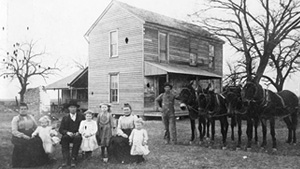Capt. George Marcus Swink
b. March 22, 1832 in Alabama
d. February 14, 1905 in Dallas, Texas
Obituary, transcribed by K. Jane Beaver from original newspaper obituary, presumably the
Dallas Morning News, Wednesday, February 15, 1905.
CAPT. SWINK DEAD
──────
CAME HERE IN 1868 WHEN DALLAS
WAS VILLAGE AND UNDERTOOK
IMPORTANT ENTERPRISES
──────
HAD FIRST STREET CAR LINE
──────
Was one of the Builders and Original
Owners of Iron Bridge Across
the Trinity
──────
After an illness which had confined him to his bed since Saturday Capt. George Marcus Swink, an old resident and prominent citizen of Dallas, died at his home at 431 Bryan street at 10:15 o’clock yesterday morning, aged 72 years, 10 months, and 23 days. The funeral services will be held at 2 o’clock this afternoon.
Probably no man was more closely identified with the upbuilding of Dallas in its early days than Capt. Swink. Coming here in 1868 when the town was a village he at once began enterprises, which afterward figured as important features in the development of a growing city, and he took an active part in municipal affairs until his death.
Capt. Swink was born in Alabama March 22, 1832. When 7 years of age he removed with his parents to Missouri, where he grew to young manhood. Here he established a mercantile house, and just before the war he was elected to the State Legislature, serving until the outbreak of the trouble between the States, when he linked his fortunes with those of the South.
He served throughout the war and made an excellent record, being promoted from private at Quartermaster of Gen. Parsons’ brigade. Near the close of the struggle he came with the army of Gen. Sterling Price to Texas, where his family had sought refuge from the persecutions inMissouri. For a few years he remained with his family in Limestone County where they had located during the war, and in 1868 he removed to Dallas.
With the exception of a few years when he was serving as Grass Commissioner in Western Texas under appointment from Gov. Ireland Dallas has been his home since 1868. While in Western Texas Capt. Swink was elected County Judge of Crosby County. He served in this office two years, returning to Dallas at the expiration of his commission.
He has held many positions of trust, and at the time of his death was a member of the Board of Appeals of this city, having served continuously for fourteen years. He also served terms as City Secretary and Alderman.
The most interesting facts about his life are found in the story of the early development of the city. In the early ‘70s he projected the enterprise and was secretary of the company which built the first street car line in Dallas. This line was operated on Main Street between the court house and the Central railway and one of the two cars which comprised its rolling stock was named the Belle Swink.
He was also one of the builders and original owners of the iron bridge across the Trinity and the timeworn cornerstone of the old tollhouse still bears his name. He hauled the material for the construction of this bridge with ox teams from Corsicana, which was then the terminus of the Houston and Texas Central Railway. This bridge diverted much trade to Dallas and was perhaps the first permanent improvement made in the county.
During the earlier years of his residence here he engaged in the mercantile business, and had a dry goods store on the court house square. Later he entered the banking business and organized and became cashier of the Exchange Bank. This was then a State institution, but it is now changed to the National Exchange Bank, and the picture of Capt. Swink adorns its walls. At his home in Missouri he was married to Miss Elizabeth Roberts in 1854. She, two daughters, Mrs. W. L. Henry and Mrs. J. T. Buckingham, two sons, C. E. and Edgar Swink, besides a number of grandchildren and great-grandchildren, survive him. All of the children were present when he died.
For many years Capt. Swink has been an active member of the First Methodist Church, and the funeral services this afternoon will be conducted by the pastor of that church, Dr. John M. Moore.
Last night the City Council adopted the following resolution:
“Whereas, On Tuesday morning, Feb. 14, 1905, it has pleased an all wise and loving Providence to call until Himself our highly respected city official and beloved citizen, Capt. G. M. Swink, chairman of the Board of Appeals of the City of Dallas,
“Resolved by the City Council of the City of Dallas, (1) That we feel in the death of Capt. G. M. Swink the City of Dallas suffers a distinct loss; (2) that he in all respects filled every measure of public duty imposed upon him and as a citizen he represented in the highest sense a sincere, upright, progressive and patriotic citizen; (3) that we extend to his bereaved family our sincere sympathy in the midst of their great affliction. Be it further
“Resolved, That this resolution be spread upon the minutes of the Council, and a copy of the same be sent by the City Secretary to the family of deceased.”
“W. G. Edwards.”


